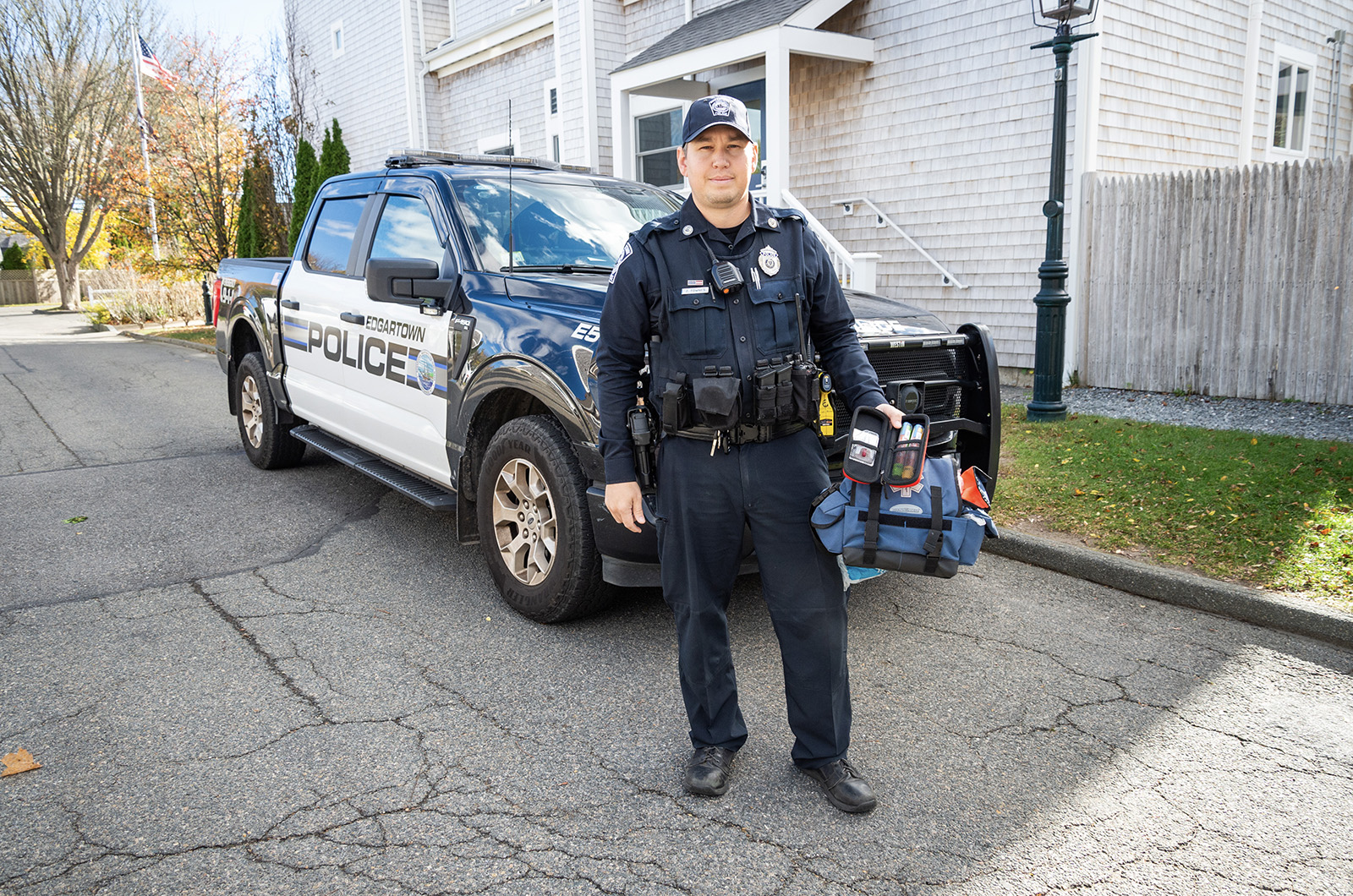Not long after Michael Brown died unexpectedly last fall due to anaphylactic shock caused by a wasp sting at a charity golf tournament on the Island, his wife Megan Brown began thinking about how to help others in a similar dire situation.
Thanks in part to Ms. Brown’s advocacy, the Edgartown police department has begun to carry EpiPens to administer in emergency situations.
“They listened with open hearts and acted swiftly to make it a reality,” Ms. Brown said in a statement. “While nothing can change the loss of my husband last October 15th, we have the power to prevent this tragedy from happening to others in our community.”
Ms. Brown first approached Edgartown police Chief Bruce McNamee (now retired) in April to discuss the possibility of having police carry epinephrine. She also began gathering signatures to petition the state to support similar measures around the Commonwealth.
EpiPens and other epinephrine auto-injectors deliver a dosage of adrenaline to treat anaphylaxis, a severe allergic reaction that can be fatal. Since police officers are often first responders, having the medication on hand can mean the difference between life and death.
“There have been programs over six and half years that I’m proud of, getting EpiPens is absolutely one of them,” said Mr. McNamee.
Mr. McNamee and interim police chief Chris Dolby, who was a lieutenant at the time Ms. Brown approached the department, reached out to Dr. Karen Casper, the medical director for the Martha's Vineyard Hospital, to formulate a plan to get EpiPens into the hands of Edgartown police officers.
“More often than not we are there before anybody else and, obviously, to somebody who is experiencing anaphylactic shock, timing is everything,” Chief Dolby said. “If we can have the proper medicine and be able to administer it and not have to wait...it just makes sense for all of us to have it in all our responding vehicles.”
Dr. Casper has developed similar programs for Vineyard police departments in the past. In 2017 and 2018, she worked to get Island officers trained to administer naloxone, also known as narcan, a medication used to reverse opioid overdoses. At the time, naloxone was not available over the counter as it is today.
“When we first started with narcan, it was similar, because you couldn’t buy it, but when people realized the importance of access to narcan, it became more common,” said Dr. Casper. “Maybe that’s the future with autoinjectors, but that’s up to the FDA.”
The police department had to apply to the Massachusetts Controlled Substances Registration in order to buy epinephrine, as they do for naloxone. The application was completed in August. In addition to helping the police department acquire the medication, Dr. Casper worked to make sure officers were trained in step with EMS training for EpiPen usage. While police are given first aid training, she wanted to expand it to include more information about the indicators of anaphylaxis and how to interface with EMS about the usage of EpiPens.
Dr. Casper also created a quality control program so that every time an auto-injector is used, the case is reviewed.
“I wanted to make sure everything gone over in their police training was gone over again and more robust,” Dr. Casper said. “It’s really important that when a police department starts something like this they have a way to review it and that it’s a quality program.”
The training was conducted by paramedic Trulayna Rose.
While police departments acquire epinephrine through state licensure, individuals are only able to purchase epinephrine autoinjectors if they have a prescription. Patients who experience a severe allergic reaction for the first time, such as Mr. Brown did, do not have ready access to the medication.
Dr. Casper said that even for people with prescriptions, there is always a chance they might forget their medication at home or leave it in the car.
“Having more EpiPens in the hands of the right people can only help,” she said.
Dr. Casper added that while the numbers of anaphylaxis on the Island is on par with the mainland, the rise of Alpha-gal syndrome, an allergy to red meat and other mammal products that is spread by lone star ticks, makes the risk of anaphylactic shock higher on the Vineyard.
According to Dr. Casper, other Island police departments have reached out to discuss expanding the program.
Ms. Brown says she is grateful for the work that Dr. Casper and the Edgartown police department have done, and hopes it will prevent future deaths.
“Police officers are often the first to respond in emergencies, and when seconds matter, it is essential that they have every tool necessary to save lives,” Ms. Brown said in a statement. “Having EpiPens readily available in the hands of our police can mean the difference between life and death in critical situations.”





Comments (4)
Comments
Comment policy »